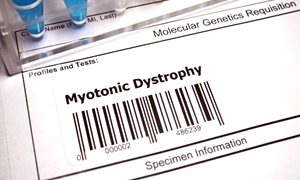
Patients with the rare disorder Myotonic Dystrophy often have difficulties participating in society. The OPTIMISTIC clinical trial, conducted by several centers and coordinated by Baziel van Engelen, neurologist at Radboudumc, showed that cognitive behavioral therapy can significantly improve the activity and social participation of myotonic dystrophy patients.
Blood test
More recently, researchers from Radboudumc’s department of Medical Biosciences and Neurology found that Myotonic Dystrophy leaves a molecular fingerprint of some 600 gene products in the blood that are indicative of the severity of the disease. As a result of successful therapy, around 100 genes from this fingerprint returned to levels that are more similar to those in healthy people. These findings were confirmed in another group of myotonic dystrophy patients.
Researcher Peter-Bram 't Hoen said, "Our findings support the utility of using blood to track disease-relevant changes in myotonic dystrophy and other muscle disorders. This is going to help us to objectively determine the effect of lifestyle or drug interventions. It is a small but critical step in the development of treatments for myotonic dystrophy patients."
Myotonic Dystrophy
Myotonic dystrophy type 1 (DM1) is a genetic disorder impacting several body systems. It occurs in one in every 8,000 people. It is characterized by progressive weakness and loss of muscle and a number of other symptoms, including severe fatigue, apathy, cataracts, and insulin resistance.
Cognitive Behavioral Therapy
Cognitive Behavioral Therapy is a form of psychotherapy in which patients learn to cope better with their disease symptoms. Often, this has positive effects on patients' physical activity and fatigue as well as their participation in society.
Publication
The results of the study have been published, "Clinical improvement of DM1 patients reflected by reversal of disease-induced gene expression in blood," in BMC Medicine (November 2022)
More information
Related news items

Towards molecular therapies for Myotonic Dystrophy
1 October 2019ReCognitION, a new 1.3 M€ European project under the leadership of Peter-Bram ‘t Hoen, Baziel van Engelen and Jeffrey Glennon, was kicked-off in Gent.
go to page





